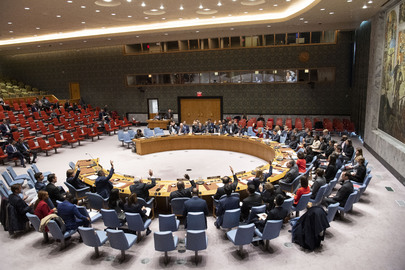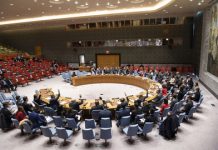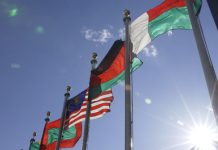She said that since 1975, glaciers have lost more than 9,000 billion tons of ice – equivalent to a 25-metre-thick block covering all of Germany.
“At current rates, many glaciers may not survive this century, reshaping landscapes, ecosystems, livelihoods and water security on a global scale,” she warned.
“This is not just a mountain crisis – it is a slow-moving global catastrophe with far-reaching consequences for planet and people.”
Not just ice
Ms. Mohammed was speaking a day after visiting the Vanj Yakh Glacier in north-central Tajikistan where she witnessed the “breathtaking beauty” of this crucial mass of dense ice.
The glacier is a vital water source for many communities in Central Asia, feeding rivers and helping to sustain millions of lives and livelihoods.
But due to climate change, it is melting. Quickly. Over the past 80 years, it lost the equivalent of 6.4 million Olympic sized pools of water.
The International Conference on Glaciers’ Preservation, held 29 May to 1 June in Tajikistan’s capital, is highlighting the ways in which glacier retreat threatens lives and livelihoods worldwide.
“This is not just ice. This is food, water and security for generations to come,” said Ms. Mohammed.
‘Our glaciers are dying’
Glaciers, along with ice sheets, store approximately 70 per cent of the world’s freshwater, making them essential for human survival and economies. But five of the past six years have witnessed the most rapid glacier retreat on record.
“Our glaciers are dying,” said Celeste Saulo, Secretary-General of the World Meteorological Organization (WMO), a co-organizer of the conference.
“The death of a glacier means much more than the loss of ice. It is a mortal blow to our ecosystems, economies, and social fabric.”
Melting glaciers increase the likelihood and severity of floods and mudslides, in addition to impacting various industries such as agriculture and forestry.
Bridging science and action
Ms. Mohammad said that the rate of glacier retreat means that the international community must take immediate action.
“The time to act is now for our people and our planet,” she said.
The conference in Dushanbe has worked to elevate glacier preservation to the top of the worldwide climate agenda ahead of the UN COP30 climate change conference in Brazil this November.
Ms. Saulo emphasized that strengthening glacier monitoring and improving warning systems for glacier collapse will help “bridge science and services.” She also said that this must all translate into concrete action to slow glacier retreat.
In Tajikistan specifically, Parvathy Ramaswami — the UN Resident Coordinator in the country — said that they have focused on supporting farmers through training and knowledge transfer for local communities.
“[The training] means that more children are safe from disasters, they can go to school, learn and grow,” she explained. “Families and communities become resilient and prosper.”
Deputy Secretary-General Amina Mohammed (centre) with Model UN youths and Ambassador for a Day in Tajikistan.
Intergenerational conversations
In Tajikistan, the Deputy Secretary-General met with many youth climate activists. She emphasized that actions to address glacier retreat must be intergenerational, much like the conversations which the conference encouraged.
“The global decisions we are shaping today will affect [young people’s] lives. So to think that we can begin to shape a person’s future without them, really doesn’t bode well for the rights that they have to determine their future, their aspirations,” she said.
In giving advice to younger generations, she expressed hope that young activists would continue to advocate for their vision of the future.
“They should continue to raise their voices, they should continue to have their courage of conviction, they should remember that this is about a life journey and they need to make every step count.”
Source of original article: United Nations (news.un.org). Photo credit: UN. The content of this article does not necessarily reflect the views or opinion of Global Diaspora News (www.globaldiasporanews.com).
To submit your press release: (https://www.globaldiasporanews.com/pr).
To advertise on Global Diaspora News: (www.globaldiasporanews.com/ads).
Sign up to Global Diaspora News newsletter (https://www.globaldiasporanews.com/newsletter/) to start receiving updates and opportunities directly in your email inbox for free.



























